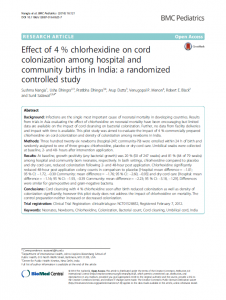
Background
Infections are the single most important cause of neonatal mortality in developing countries. Results from trials in Asia evaluating the effect of chlorhexidine on neonatal mortality have been encouraging but limited data are available on the impact of cord cleansing on bacterial colonization. Further, no data from facility deliveries and impact with time is available. This pilot study was aimed to evaluate the impact of 4 % commercially prepared chlorhexidine on cord colonization and density of colonization among newborns in India.
Methods
Three hundred twenty-six newborns (hospital-247; community-79) were enrolled within 24 h of birth and randomly assigned to one of three groups: chlorhexidine, placebo or dry cord care. Umbilical swabs were collected at baseline, 2- and 48- hours after intervention application.
Results
At baseline, growth positivity (any bacterial growth) was 20 % (50 of 247 swabs) and 81 % (64 of 79 swabs) among hospital and community born neonates, respectively. In both settings, chlorhexidine compared to placebo and dry cord care, reduced colonization following 2- and 48-hour post application. Chlorhexidine significantly reduced 48-hour post application colony counts in comparison to placebo [Hospital: mean difference = −1.01; 95 % CI: −1.72, −0.30 Community: mean difference = −1.76; 95 % CI: −2.60, −0.93] and dry cord care [Hospital: mean difference = −1.16; 95 % CI: −1.93, −0.39 Community: mean difference = −2.23; 95 % CI: −3.18, −1.29]. Differences were similar for gram-positive and gram-negative bacteria.
Conclusions
Cord cleansing with 4 % chlorhexidine soon after birth reduced colonization as well as density of colonization significantly; however this pilot study does not address the impact of chlorhexidine on mortality. The control preparation neither increased or decreased colonization.